INTRODUCTION
For decades, the contours of the Cold War had largely determined American action abroad. Strategists saw each Third World coup, revolution, and civil war as part of the larger struggle between the United States and the Soviet Union. But after 1989 with the Soviet Union vanquished, the United States was suddenly free of this paradigm, and Presidents Bush, Clinton, Bush, Obama, Trump, and Biden have seen international crises differently from their predecessors.
President George H. W. Bush envisioned a post-Cold War role in which the United States used its overwhelming military superiority and influence as global policing tools to preserve peace. President Bill Clinton also used the armed forces in this policing role. President George W. Bush oversaw the opening of a new conflict – the fight against terrorism – but both he and Barack Obama also sent America’s fighting men and women into combat in the role of the world’s police force.
Can this be America’s role in the world? Can we act as the police officer, patrolling the smaller conflicts, weighing in and picking sides to ensure that justice is served and peace preserved? 2000 years ago the Mediterranean World lived under the so-called Pax Romana as the forces of the Roman Empire ensured a long period of peace between former enemies who fell under the reach of their empire. Can, or should the world now live in an era of Pax Americana?
What do you think? Can the United States be the world’s police officer?
THE FIRST GULF WAR
The Middle East had always been a source of interest for the United States. Jews who had survived the Holocaust in Europe during World War II, fled to Palestine in the Middle East and founded the modern nation of Israel which Americans have always supported. The nations of the Persian Gulf supply the United States and the rest of the world with oil, an essential ingredient of the modern economy. During the Cold War, conflicts in the Middle East, such as the war between neighbors Iraq and Iran served as proxies for our conflict with the Soviet Union. For these, and a variety of lesser reasons, the Middle East has always been a point of American interest.
At the end of the Cold War, the Middle East became a source of increased concern. In 1988, Iraq faced a problem. It had run up an enormous debt during its war with neighboring Iran. At the same time, other Arab states had increased their oil production, forcing oil prices down and further hurting Iraq’s economy. Iraq’s leader, Saddam Hussein, approached these oil-producing states for assistance, particularly Saudi Arabia and the tiny, but wealthy neighboring Kuwait. When talks broke down in August 1990, and Iraq found itself politically and economically isolated, Hussein ordered an invasion of oil-rich Kuwait.
The invasion of Kuwait served as a new test for the United States in the post-Cold War era. President George H. W. Bush had a choice. On the one hand, he could intervene to protect Kuwait, essentially recasting the role of the United States from Soviet adversary into global cop. On the other, the United States could stand back and allow minor conflicts around the world to go on without notice. For many, the second option seemed best. After all, without the threat of communism, what possible reason did the United States have to get involved?
President Bush, however, chose the first option. He and his foreign policy team forged an unprecedented coalition of 34 countries, including many members of NATO and the Middle Eastern countries of Saudi Arabia, Syria, and Egypt, to oppose Iraqi aggression. The Saudis had never allowed American troops on their soil before, and during the Cold War Syria and Egypt had been friendly with the Soviet Union. Bush hoped that this coalition would herald the beginning of a “new world order” in which the nations of the world would work together to deter belligerence. For the first time, Woodrow Wilson’s dream of moral diplomacy looked like it might be coming true.
A deadline was set for Iraq to withdraw from Kuwait or face serious consequences. Bush first deployed troops to defend Saudi Arabia in Operation Desert Shield. Bush succeeded in getting resolutions from Congress authorizing the use of military force against Iraq and the United States launched an effective bombing campaign. The air war was the first time the United States deployed some of its new, high-tech weaponry, including stealth bombers and laser-guided bombs. After successfully weakening the Iraqi defenses, the United States launched Operation Desert Storm, a 100-hour land war involving over 500,000 American troops and another 200,000 from 27 other countries. Iraq’s army was expelled from Kuwait and almost entirely destroyed. Together, Operations Desert Shield and Desert Storm are now known as the First Gulf War. Primary Source: Photograph
Primary Source: Photograph
President George H. W. Bush flew to the Middle East to meet the troops during the First Gulf War.
Some controversy arose among Bush’s advisors regarding whether to end the war without removing Saddam Hussein from power, but General Colin Powell, the head of the Joint Chiefs of Staff, argued that to continue to attack a defeated army would be “un-American.” Bush agreed and troops began moving out of the area in March 1991. Although Hussein was not removed from power, the war nevertheless suggested that the United States no longer suffered from Vietnam Syndrome and would deploy massive military resources if and when it thought necessary. In April 1991, United Nations Resolution 687 set the terms of the peace, with long-term implications. Its concluding paragraph authorizing the UN to take such steps as necessary to maintain the peace was later taken as the legal justification for the further use of force, as in 1996 and 1998, when Iraq was again bombed. It was also referenced in the lead-up to the second invasion of Iraq in 2003, when it appeared that Saddam Hussein was refusing to comply with other UN resolutions.
Apart from the end of Vietnam Syndrome, the Gulf War was important for a number of other reasons. Unlike the Vietnam War, Bush’s use of the military to stop one nation from invading a smaller neighbor proved to be enormously popular. Americans tied yellow ribbons around trees in their yards and on the radio antenna of their cars to show support for the troops. At the Super Bowl in 1991, Whitney Houston sang the National Anthem, then released the recording which went platinum. Americans were caught up in patriotic fervor. So many who had feared “another Vietnam,” but video images of laser guided bombs blowing up Iraqi radar stations and missile sites gave Americans reason to be proud of their nation’s status as the world’s greatest military power. It was the first war to be shown on cable news, and it went so well that the tiny minority of people who protested were drowned out by the enormous show of support for the president and the armed forces. For the military itself, the war had enormous consequences. The leaders of the war, like Colin Powell, had been young officers in Vietnam, taking orders from an older generation. This time, they were in charge, and they showed that the modernized army, navy, and air force with its high tech weapons had come a long way since the days of the disaster in Vietnam. Primary Source: Photograph
Primary Source: Photograph
Whitney Houston’s rendition of The Star Spangled Banner at the Super Bowl during the First Gulf War is the only recording of that song ever to break the Top 10 charts for popular music in the United States.
MIDDLE EAST PEACE NEGOTIATIONS
As discussed earlier, the United States has been a strong ally of the nation of Israel since its inception after World War II. Israel’s history is one of violent conflict with its neighbors. The mostly Muslim, Arab nations that exist today in the Middle East around Israel were British protectorates at the end of that war and did not want to lose land to what they saw as invaders. The Jewish immigrants who built the nation of Israel fought a war for their existence against these Arab neighbors in 1948 and won. That victory ensured the existence of their country, but also set up a long-standing conflict, that the United States has always been interested in ending.
Most problematic was the fate of the Palestinians, the original residents of the land that became Israel itself. Many had been expelled from their homes, or had fled during the fighting and were living in the nations surrounding Israel. Some had taken up arms under the leadership of Yasser Arafat and his Palestinian Liberation Organization, which carried out terrorist attacks on Israelis around the world.
In the 1970s, American diplomats had their first measure of success when President Jimmy Carter helped negotiate the Camp David Accords, which formalized peace between Israel and Egypt. 14 years later, another Democratic president found a way to inch the peace process along. In September 1993, at the White House, Yitzhak Rabin, prime minister of Israel, and Yasser Arafat, chairman of the Palestine Liberation Organization (PLO), signed the Oslo Accords, granting some self-rule to Palestinians living in the Israeli-occupied territories of the Gaza Strip and the West Bank. A year later, the Clinton administration helped facilitate peace treaty between Israel and its neighbor Jordan. In 2020, President Trump hosted leaders from Israel, Bahrain, and the United Arab Emirates as they jointly signed the Abraham Accords, normalizing relations between these nations.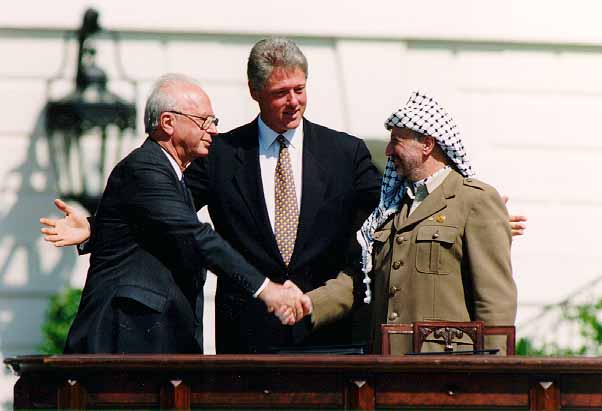 Primary Source: Photograph
Primary Source: Photograph
Yitzhak Rabin (left) and Yasser Arafat (right), shown with Bill Clinton, signed the Oslo Accords at the White House on September 13, 1993. Rabin was killed two years later by an Israeli who opposed the treaty.
THE BALKAN WARS
As a small measure of stability was brought to the Middle East, violence erupted in the Balkans, the region in the southeastern corner of Europe. For the previous half-century, the region had been united as Yugoslavia, a communist nation behind the Iron Curtain. Yugoslavia consisted of six provinces: Serbia, Croatia, Bosnia and Herzegovina, Slovenia, Montenegro, and Macedonia. Each was occupied by a number of ethnic groups, some of which shared a history of hostile relations. Ethnic and national disputes in the Balkans were nothing new. The murder of Archduke Franz Ferdinand, the trigger that led to World War I, had taken place in the heart of the Balkans. In May 1980, the leader of Yugoslavia, Josip Broz Tito, died. Without him to hold the country together, ethnic tensions increased, and this, along with the fall of communism elsewhere in Europe at the end of the 1980s, led to the breakup of Yugoslavia. In 1991, Croatia, Slovenia, and Macedonia declared their independence. In 1992, Bosnia and Herzegovina did as well. Only Serbia and Montenegro remained united as the Serbian-dominated Federal Republic of Yugoslavia.
With the fall of communism and the lack of any dominating authority like Tito, ethnic tensions within Bosnia and Herzegovina escalated into war. Yugoslavian Serbs aided Bosnian Serbs who did not wish to live in an independent Bosnia and Herzegovina. These Bosnian Serbs proclaimed the existence of autonomous Serbian regions within the country and attacked Bosnian Muslims and Croats. During the conflict, the Serbs engaged in genocide. The brutal conflict also gave rise to the systematic rape of Muslim women by Serbian military or paramilitary forces. The International Criminal Tribunal of Yugoslavia estimated that 12,000 to 50,000 women were raped during the war.
NATO intervened in 1995, and President Bill Clinton agreed to American participation in airstrikes against Bosnian Serbs. That year, the Dayton Accords peace settlement was signed in Dayton, Ohio, ending three and a half years of war in Bosnia. Four years later, the United States, acting with other NATO members, launched an air campaign against Serbian-dominated Yugoslavia to stop it from attacking ethnic Albanians in Kosovo. Although these attacks were not sanctioned by the UN and were criticized by Russia and China, Yugoslavia withdrew its forces from Kosovo in June 1999.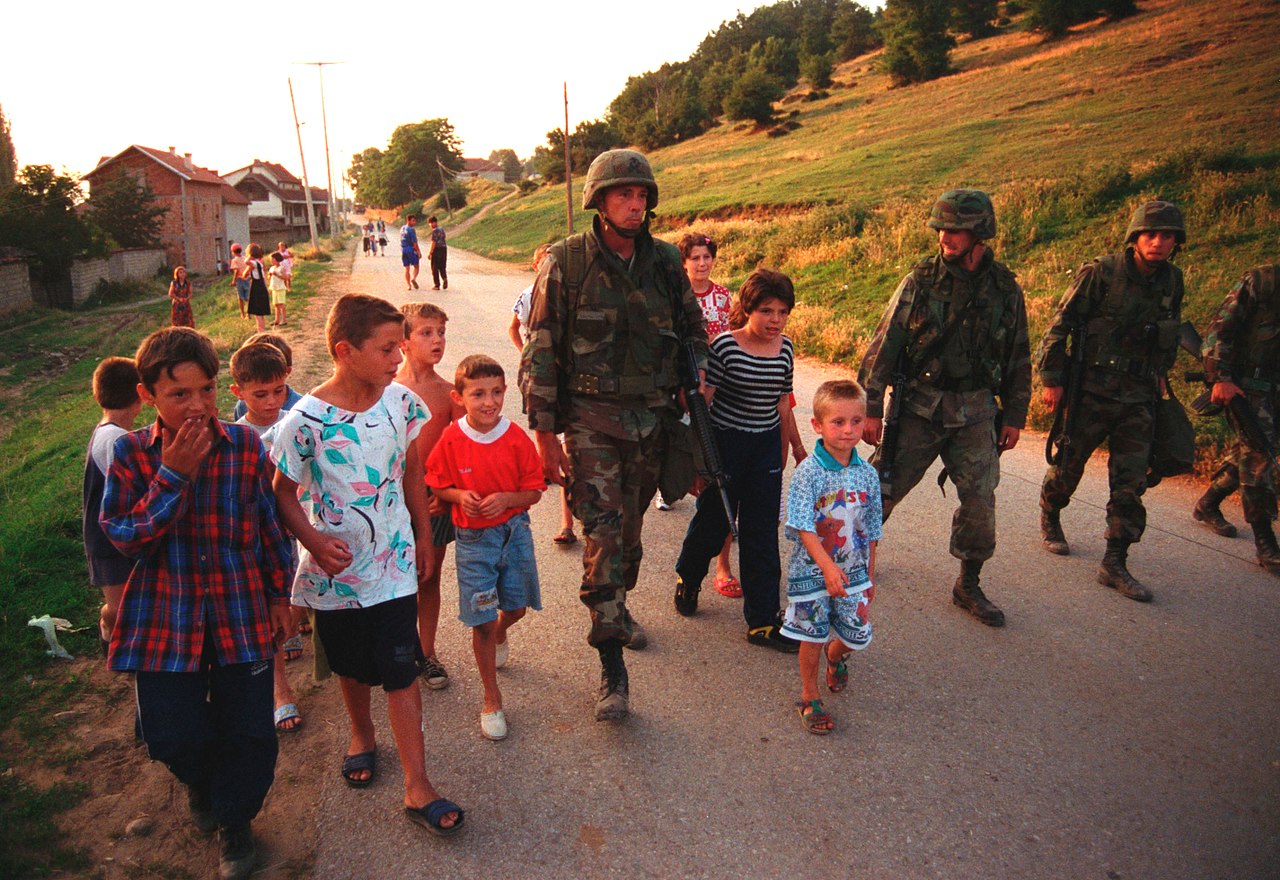 Primary Source: Photograph
Primary Source: Photograph
Marines walk with a group of children in Kosovo during the American intervention there. American soldiers have served as peace keepers in various places. The case of Kosovo is one of the successful uses of military might to end mass murder.
The fighting in the Balkans helped define a new role for NATO. First founded as a mutual defense alliance to counter the Soviet Union, some had been wondering what purpose the alliance had in the years after the end of the Cold War. Now, the years of planning, joint exercises, and coordination paid off as the forces from the various NATO powers could collaborate, share bases, hardware and carry out join missions to achieve what they saw as a goal of ending genocide. The American Secretary of State at the time, Madeleine Albright, had been a child in Czechoslovakia during World War II, and understood the dangers of hate and dictatorship on Europe. Her leadership was crucial in guiding the alliance in its new mission as a force for justice.
The United Nations established the International Criminal Tribunal for the former Yugoslavia (ICTY) after the war. A total of 161 individuals were indicted, setting an important precedent for the role of the United Nations in the years after the Cold War. Not since the Nuremberg and Tokyo war crimes trials at the end of World War II had there been an international court to force perpetrators of genocide to face justice.
SOMALIA AND RWANDA
The use of force in the decades after the Cold War did not always bring positive results. For example, in December 1992, George H. W. Bush sent a contingent of American soldiers to Somalia, initially to protect and distribute relief supplies to civilians as part of a United Nations mission. Without an effective Somali government, however, the warlords who controlled different regions stole food, and their forces endangered the lives of UN workers. In 1993, the Clinton administration sent soldiers to capture one of these leaders, Mohammed Farah Aidid, in the city of Mogadishu. The resulting battle proved disastrous. A Black Hawk helicopter was shot down, and Army Rangers and members of Delta Force spent hours battling their way through the streets. 84 soldiers were wounded and 19 died. The United States withdrew, leaving Somalia to struggle with its own anarchy.
The sting of the Somalia failure probably contributed to Clinton’s reluctance to send American forces to end the 1994 genocide in Rwanda. In the days of brutal colonial rule, Belgian administrators had given control to Tutsi tribal chiefs, although Hutus constituted a majority of the population. Resentment over ethnic privileges, and the discrimination that began then and continued after independence in 1962, erupted into civil war in 1980. The Hutu majority began to slaughter the Tutsi minority and their Hutu supporters. President Clinton was aware of the extent of the killing, but chose not to send American troops to intervene, fearing another failure like the one in Somalia. In 1998, while visiting Rwanda, Clinton apologized for having done nothing to save the lives of the 800,000 massacred in three months of genocidal slaughter. In the end, the United Nations also set up a court to try criminals from Rwanda, but justice after the fact is nothing compared to the lives that might have been saved if the powerful militaries of the world had been sent to stop the killing.
THE ARAB SPRING
Americans have a mixed record of protecting life and supporting democracy in the past decade. The various uprisings of the Arab Spring have shown the limits of both American military might and political willpower.
The Arab Spring was a series of anti-government protests, uprisings, and armed rebellions that spread across the Middle East in late 2010. It began in response to oppressive regimes and a low standard of living, beginning with protests in Tunisia.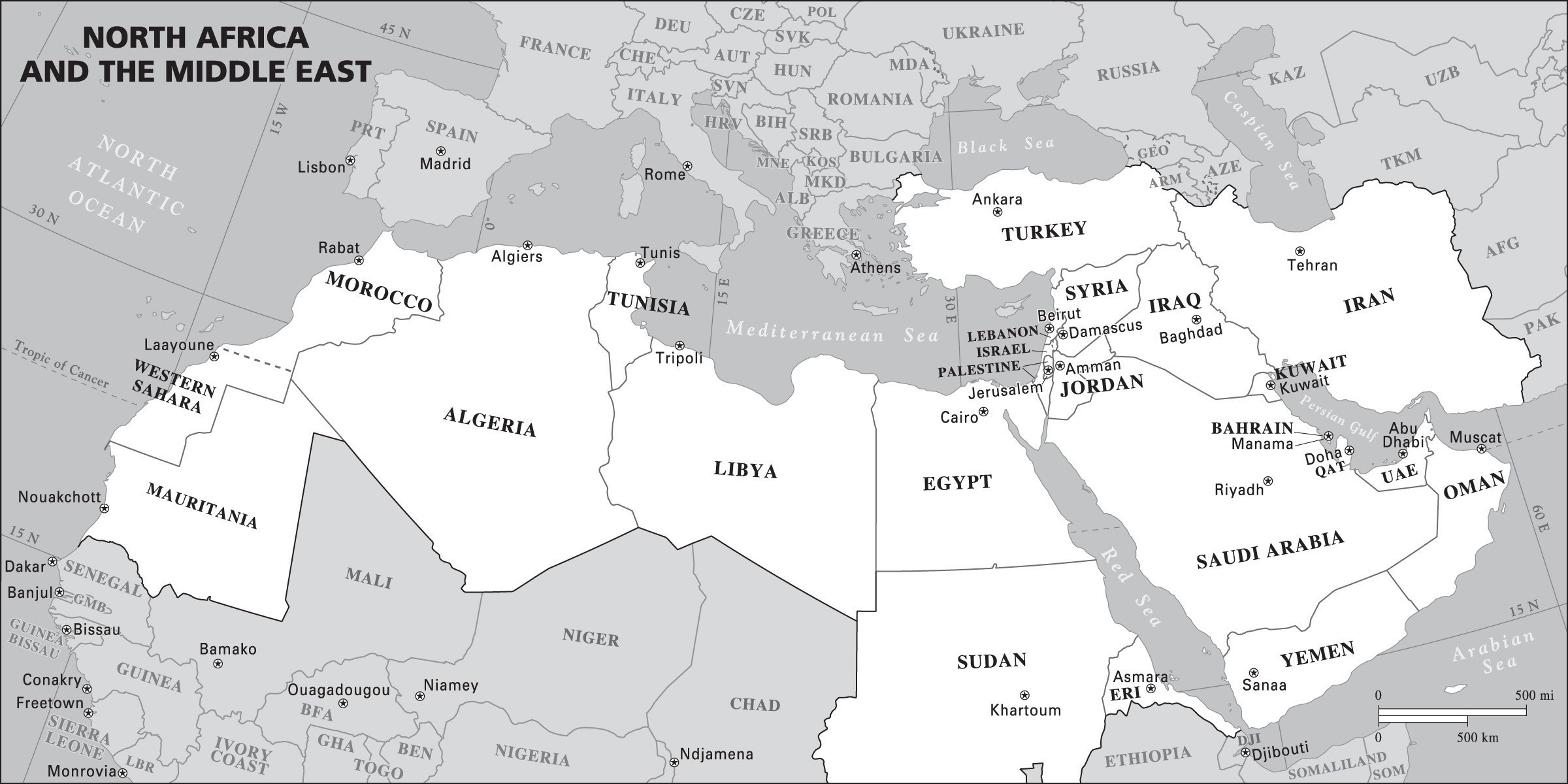 Secondary Source: Map
Secondary Source: Map
This map of Europe, the Middle East and North Africa shows almost all of the places the United States has been involved in since the end of the Cold War.
The effects of the Tunisian Revolution spread strongly to five other countries: Libya, Egypt, Yemen, Syria and Bahrain, where either the regime was toppled or major uprisings and social violence occurred, including riots, civil wars or insurgencies. Sustained street demonstrations took place in Morocco, Iraq, Algeria, Iran, Lebanon, Jordan, Kuwait, Oman and Sudan. The early hopes that these popular movements would end corruption, increase political participation, and bring about greater economic equity collapsed by mid-2012, as many Arab Spring demonstrations were met with violent responses from authorities. Large-scale conflicts resulted in Syria, Egypt, Libya and Yemen. Only the uprising in Tunisia resulted in a transition to constitutional democratic governance.
LIBYA
Protests against Libya’s dictator, Muammar Gaddafi, began in Libya in 2011 and within a few days, the opposition controlled most of Benghazi, the country’s second-largest city. Gaddafi amassed his army and prepared to invade Benghazi, promising to kill everyone in the city. To protect civilians from what appeared to be imminent slaughter, the United Nations Security Council adopted a resolution to create a no-fly zone over Libya, and authorized “all necessary measures” to protect civilians.
Two days later, France, the United States and the United Kingdom intervened in Libya with a bombing campaign against pro-Gaddafi forces. A coalition of 27 countries from Europe and the Middle East soon joined the intervention. President Obama addressed the nation and articulated America’s role as global cop. “For generations, the United States of America has played a unique role as an anchor of global security and as an advocate for human freedom. Mindful of the risks and costs of military action, we are naturally reluctant to use force to solve the world’s many challenges. But when our interests and values are at stake, we have a responsibility to act.” For Obama and his advisors, the possibility of mass murder in Libya qualified as a threat to American values. Primary Source: Photograph
Primary Source: Photograph
Airmen from the 509th Bomb Wing at Whiteman Air Force Base, Missouri prepare B-2 Spirit stealth bombers for an attack on Libya. The modern air force has the ability to send bombers around the world on long missions. Some have criticized the United States for using its military to strike from a distance, separating Americans from the actual fighting.
The air attacks did not end the war. It took five more months before anti-rebel fighters captured Tripoli, scattered Gaddafi’s government and ended his 42 years of rule. After the government fell the civil war continued between various factions within Libya. Fighting continued until a cease fire was signed in 2020. The nation remains divided with areas being separately controlled. Over 10,000 Libyans died in the fighting and tens of thousands more fled the nation.
In 2012 American ambassador J. Christopher Stephens and two other Americans were killed in an attack in the city of Benghazi. The attack became a major political scandal for Secretary of State Hillary Clinton and President Barack Obama. A total of six investigations were carried out by Republicans in Congress, none of which found significant wrongdoing on the part of Clinton or Obama, but which reminded the American public of the administration’s failure to prevent a civil war in Libya after the initial intervention.
Obama and his foreign policy team had not anticipated the chaos that would follow Gaddafi’s demise and he said in 2016 that failing to plan for Libya after Gaddafi was the “worst mistake” of his presidency.
SYRIA
Protests in Syria started in 2011 as part of the Arab Spring in response to aggressive tactics by the government security forces, most notably when they arrested children for writing antigovernment slogans. When protests erupted, approximately 3,000 people were arrested. The government responding with harsh security clampdowns and military operations when the protests spread. In July, Syrian army tanks stormed several cities killing protesters. By the end of the year, the opposition had formed into a military force and began taking control of territory in an attempt to oust Syrian president Bashar al-Assad.
Battles between the government’s security forces and the rebel Free Syrian Army intensified. Massacres ensued in which hundreds of civilians were killed in a single day. By mid-2012, the peaceful protests of 2011 had evolved into full scale civil war. The Syrian Civil War remains ongoing. The United States has opposed the government of Bashar al-Assad, due to both his opposition to democracy and his use of force against his own people.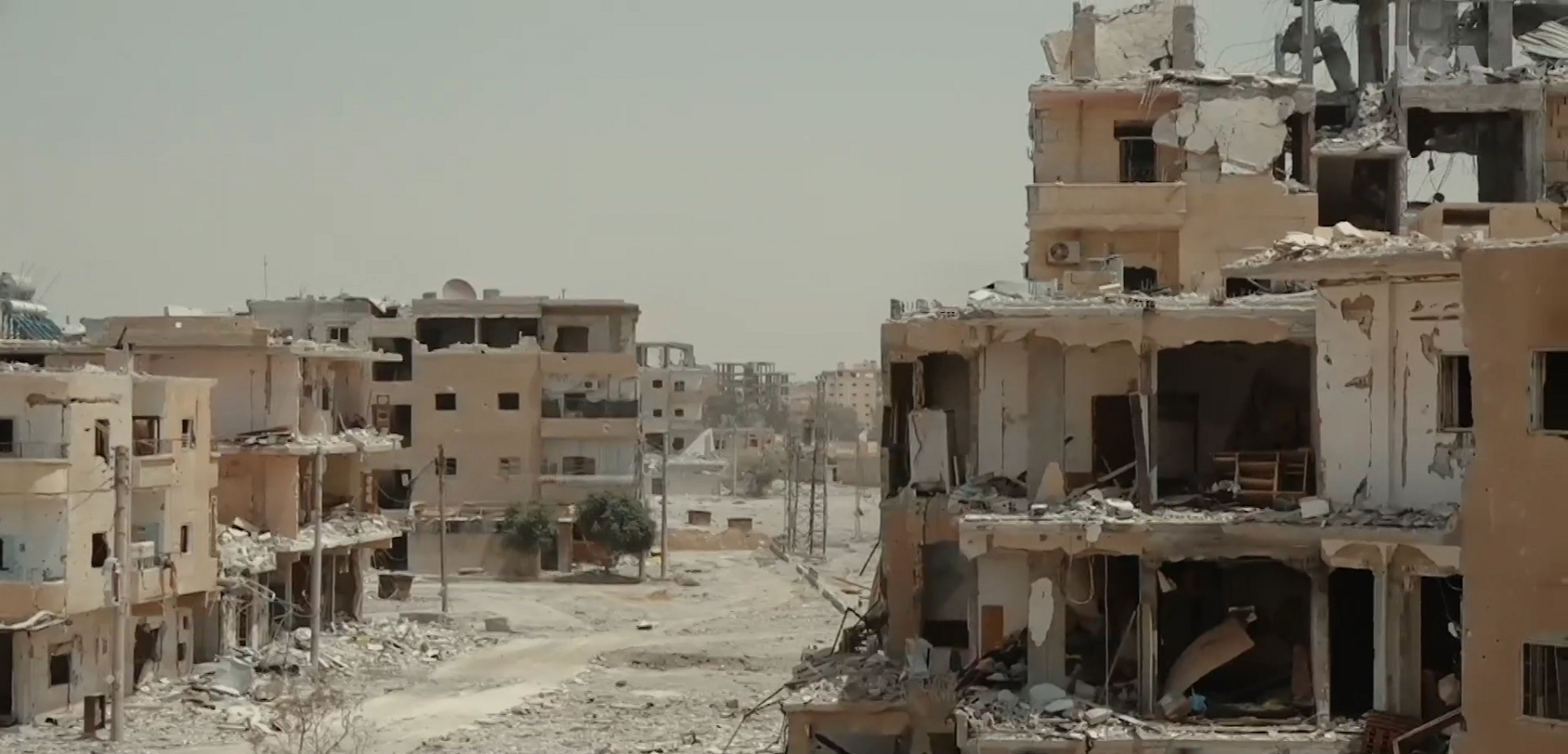 Primary Source: Photograph
Primary Source: Photograph
A destroyed neighborhood in the Syrian city of Raqqa. The war has been especially deadly for civilians.
However, Iran, Iraq, and Russia support the government. American presidents Obama and Trump have both shown great reluctance to commit the military to the fight in Syria. The United States has supported the anti-government forces with material and financing, but even in 2013 when it seemed clear that Assad had deployed chemical weapons against his own people Congress refused to give President Obama permission to use American forces in against Syria. Obama focused instead on trying to negotiate with Assad to convince him to voluntarily give up his remaining chemical weapons. This effort was at least partially successful, with Assad agreeing to turn over his chemical weapons to an international group that would destroy them. He turned over some, but not all of his chemical weapons stockpile.
The United States had not entirely stayed out of the fighting. In 2014, American aircraft conducted airstrikes against terrorist forces from Iraq that had moved into Syria as well as some against government and pro-government targets. They also deployed special forces and artillery units to engage terrorists on the ground.
Russia, on the other hand, has deployed its jets in Syria with the explicit goal of supporting Assad and the government forces. Some Americans find this deeply unsettling as Russia seems to have the upper hand in a new sort of proxy war. President Trump promised not to get involved in the Syrian Civil War as part of his America First policy but ordered a bombing raid against Assad’s forces when it was clear that they had once again used chemical weapons in an attack against civilians.
International organizations have accused virtually all sides involved, including the government, opposition rebel groups, Russia, terrorist organizations, and the United States of severe human rights violations and of massacres. Over the course of the war, a number of peace initiatives have been launched, but fighting continues.
The conflict has caused a major refugee crisis with approximately half of the entire population having been displaced. Millions have fled to neighboring Lebanon, creating unrest there. Millions have also sought refuge in Europe. While some European leaders have welcomed Syrian refugees, others have not. Anti-immigrant sentiment has been a growing political issue in Germany, France, and the United Kingdom, in large part due to the flood of refugees fleeing the civil war in Syria and other conflicts associated with the Arab Spring. Whereas President Obama was welcoming to the first waves of Syrian refugees, President Trump sought to bar all Syrians seeking a new home in America.
PUTIN’S RUSSIA
While the United States has launched airstrikes and sometimes used ground troops against weaker nations, no president has been willing to go head to head with powerful foes Russia or China. When Russia invaded its small neighbor Georgia in 2008, President George W. Bush said, “Such an action is unacceptable in the 21st Century,” and that Russia would “jeopardize” its standing with the West if it did not withdraw its forces. Although the Bush administration contemplated a military response to defend Georgia, it decided against it so as to not provoke a conflict with Russia.
The problem the United States faces today in dealing with Russia is not just that it is the successor state to the Soviet Union and possesses nuclear weapons, but also that its new leader, Vladimir Putin, is a fierce nationalist who has publicly decried Russia’s loss of prestige. He said, “the collapse of the Soviet Union was a major geopolitical disaster” and as a former Soviet spy, seems intent on manipulating global politics to his nation’s advantage. After convincing his nation to rewrite its constitution so that he could return to power, he embarked on a campaign to rebuild the glories of decades past.
Especially distressing to Americans who favor international action and an active role for the United States in promoting global peace and security are the aggressive actions of Russia in Ukraine. The Ukraine was once an important part of the Soviet Union, but since 1991 has swayed between pro-Russia and pro-European politics. The nation itself is divided between Ukrainians who speak the Ukrainian language, and those who speak Russian. In 2014, Ukrainians who wanted closer ties with the West rose up in protest in the capital city of Kiev when the president announced the he would not be signing a trade agreement with the European Union. That president, Viktor Yanukovych, eventually fled to Russia and power was turned over to a pro-European president. Primary Source: Photograph
Primary Source: Photograph
Vladimir Putin meeting with President Obama in 2012. A series of American presidents have been unable to control Putin’s aggressive actions.
Following the ousting of Yanakovych, Putin ordered Russian troops to occupy Crimea, a peninsula that had been a part of Ukraine since 1954 but had been Russian territory before that. Putin declared that the territory rightfully belonged to Russia, and given that most of the residents were pro-Russian, Russian speaking Ukrainians, his forces faced little opposition as they swept in and installed a new government subordinate to Russia.
Western leaders, including President Obama were horrified at Putin’s aggression. Many saw parallels to Saddam Hussein’s invasion of Kuwait. However, despite tough talk, the United States did nothing to stop the Russian invasion. Obama noted, “Bigger nations can bully smaller ones to get their way.” Like Truman who was criticized for allowing communists to take over China in 1949, Obama was criticized by his political opponents for not preventing a conflict he had little control over. Launching a military attack against Russia today is as unthinkable as invading China seemed in the late 1940s.
Putin went further by ordering his troops, sometimes in uniform and sometimes not, into Eastern Ukraine. In 2014, a Russian missile was used to shoot down a Malaysian Airlines flight as it passed over the border between Russia and Ukraine. While Russia’s government claims innocence, American leaders and an international investigation lay blame on Russia’s military units inside of Ukraine. As was the case when Putin order his forces into Crimea, Americans complained, but did not take military action.
In response to Russia’s actions in the Ukraine and Crimea, the United States and its European allies implemented sanctions against Russian businesses and top government officials. These sanctions were responsible for the collapse of the Russian economy in 2015. One reason Putin was so eager to help Donald Trump win the presidency in 2016 was that Trump proposed reducing the sanctions in an effort to reduce tensions between the United States and Russia. Throughout his presidency, Donald Trump made efforts to ease tensions with Russia and met with Putin multiple times but was unsuccessful in getting Putin to agree to any of his demands. Trump’s policy toward Russia, as well as meetings he had with North Korean dictator Kim Jung-un, were used by his political opponents to claim that he was cozying up to dictators. In Biden’s first year as president, he abandoned Trump’s openness to negotiation and his administration again implemented harsh sanctions against Russia.
CONCLUSION
For the purposes of studying history, we have broken down Americans military activities after the Cold War into two broad categories: police actions, and the war on terrorism. Everything you just learned about American intervention in the Middle East, the Balkans, Africa and Ukraine, is only part of the story. It was be entirely understandable if you started to long for the simplicity of the Cold War. You would not be alone. Truly, America’s foreign affairs are complicated. Whereas the Cold War had a simple goal: stop communism, the years since have been much less one-dimensional.
In 1990 when President George H. W. Bush launched the First Gulf War and expelled the Iraqis from Kuwait, it seemed that the role for the United States might been global police officer. When Bill Clinton led NATO’s efforts to end genocide in the Balkans that role appeared to be solidified. But then the United States did not stop genocide in Rwanda or a civil war in Syria, and refused to even consider military force against Russia, which leaves us today with some interesting questions.
Should we try to be the world’s police officers? Or should we embrace President Trump’s motto of America First. Given that Russia and China both possess nuclear weapons, could we be the world’s police officers even if we wanted to? What responsibility do we have to others as a democracy and the world’s most powerful military and economy?
What do you think? Should the 21st Century be an age of Pax Americana? Can, or should the United States be the world’s police officer?
CONTINUE READING
- Previous: Introduction
- Next: The War on Terror & Gun Violence
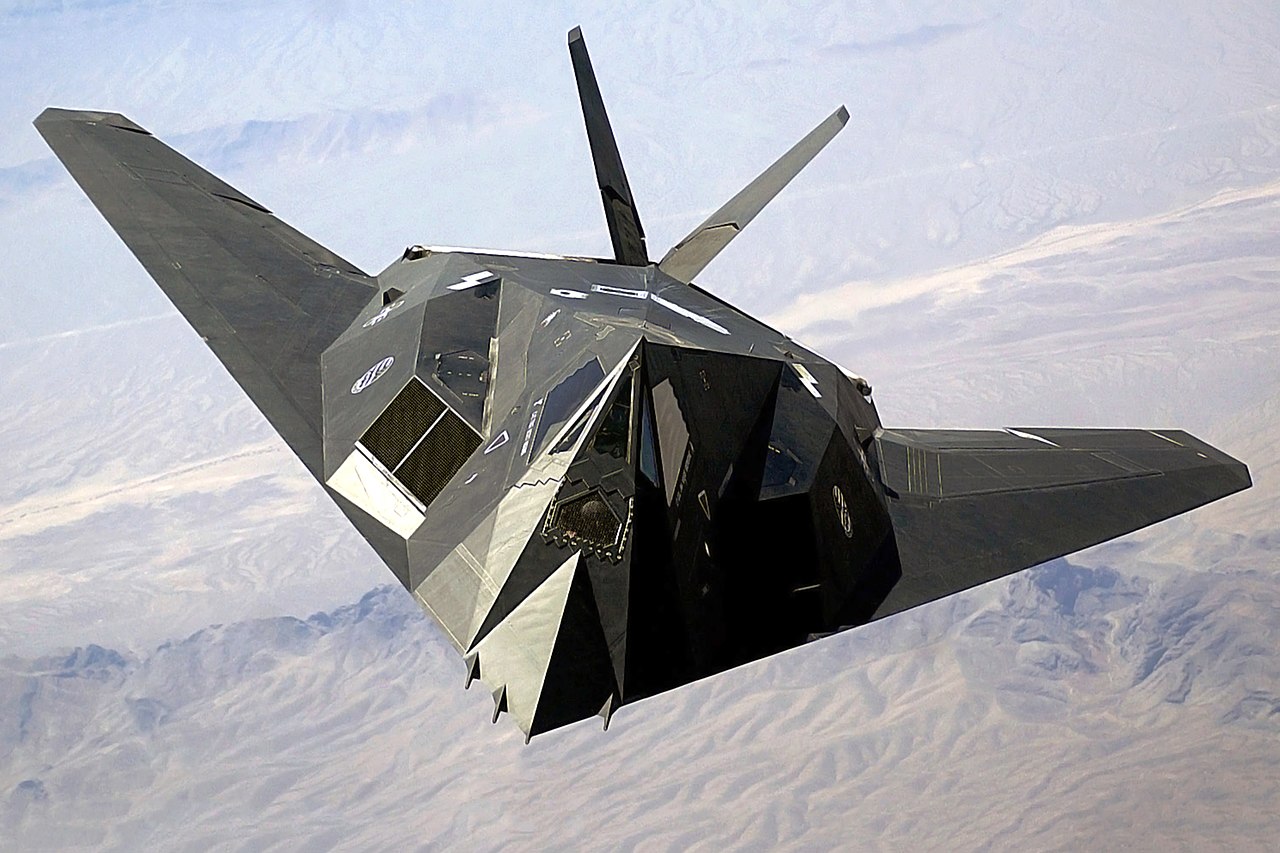
SUMMARY
BIG IDEA: After the Cold War ended, the United States has taken on the role of the world’s police officer, preventing genocide and maintaining international law. While Americans have been successful in some conflicts, we have also faced limitations to the extent of our power, most notably in the Middle East and with Russia.
After the end of the Cold War, many people were not sure what the United States’ new role in the world should be. President George H. W. Bush helped define that role in 1991 by using the military to stop Saddam Hussein from annexing Kuwait into Iraq. He organized a coalition of nations and won United Nations approval for the First Gulf War. It was a successful operation, was hugely popular at home, and ended Vietnam Syndrome.
Presidents Carter, Clinton and Trump helped negotiate peace treaties between Israel and its Arab and Palestinian neighbors. President Clinton also guided NATO’s use of the force to end genocide in the Balkans in two separate wars against Serbia.
The United States was unsuccessful in bringing peace to Somalia and refused to intervene in Rwanda to stop a genocide.
In 2010 a series of revolutions and protests in the Middle East and North Africa known as the Arab Spring produced multiple conflicts. The United States used air power in Libya to prevent Muammar Gaddafi from carrying out mass murder, but did not prepare for chaos in that nation after his fall. Americans have provided funding and weapons to rebels in Syria, but have not been fully committed to the civil war there, although Russia has. Congress voted not to participate in the war during the Obama Administration and Trump’s America First policy was popular specifically because many Americans are fearful of involvement in another Middle Eastern conflict.
Russian president Vladimir Putin has caused Americans many problems. He invaded the small nation of Georgia, and invaded the much larger neighbor of Ukraine. The United States has protested and imposed sanctions, but has not used military force against this nuclear-armed enemy.

VOCABULARY
![]()
PEOPLE AND GROUPS
Saddam Hussein: Dictator of Iraq from 1979 until 2003. He was a strong Arab nationalist and led his nation during the Iran-Iraq War as well as the First Gulf War and the American invasion of Iraq after 9/11.
Colin Powell: Chairman of the Joint Chiefs of Staff during the First Gulf War and later Secretary of State under George W. Bush at the start of the War on Terror.
Madeleine Albright: Secretary of State under Bill Clinton in the 1990s. She was the first woman to hold the position and a strong advocate of military intervention in the Balkans to prevent genocide.
Vladimir Putin: President of Russia. He believes that Russia should rebuild its power in the world and has led his nation in attacks on neighbors Georgia and Ukraine, as well as ordered the interference in American and other European nations’ elections.
![]()
KEY IDEAS
Genocide: Mass murder in an attempt to eliminate and entire population of people. The Holocaust of Jews in Europe during World War II is one example.
Russian Sanctions: Restrictions on Russian business dealings implemented by Congress after the Russian invasion of Crimea and Ukraine in 2014. They negatively impacted the Russian economy and are one reason Russia interfered in the American election in 2016. Sanctions were established again in 2021 as punishment for cyber-hacking.
America First: President Trump’s foreign policy. He generally has advocated isolationism, but has used the military to intervene in some cases, such as in Syria.
![]()
LOCATIONS
The Balkans: Region in southeastern Europe made up of many small nations. It marks the boundary between Christian Europe and the Muslim Middle East and has traditionally been a source of conflict throughout history. World War II started there and it was the site of intense civil wars following the collapse of Yugoslavia at the end of the Cold War.
Serbia: Christian Slavic nation in the Balkans. It is the center and largest nation to be formed after the fall of Yugoslavia at the end of the Cold War and was the aggressor in the wars during the 1990s against its neighbors Bosnia and Kosovo.
Bosnia and Herzegovina: Independent nation that was formed in the Balkans after the fall of Yugoslavia at the end of the Cold War. It was the site of intense civil war and genocide as Christian Serbs murdered Muslims. The war concluded with the Dayton Accords in 1995.
Kosovo: Independent nation that was formed in the Balkans after the fall of Yugoslavia at the end of the Cold War. Its population is primarily ethnic Albanian and the United States led NATO in a bombing campaign to prevent Serbia from carrying out mass murder.
Somalia: Nation in the east of Africa. The government failed there and the United States has tried at various times to provide humanitarian aid. In 1992, American soldiers carried out a failed mission in which 19 American soldiers died trying to protect UN workers.
Rwanda: Small nation in east-central Africa that was the site of genocide in 1994. President Bill Clinton and the United States was criticized for not intervening to stop the massacre.
Libya: Arab nation in North Africa. For many years it was ruled by dictator Muammar Gaddafi until he was overthrown during a revolution that grew out of the Arab Spring. Airstrikes by American, French and other nations protected civilians during the revolution and weakened Gaddafi’s forces.
Syria: Arab nation at the eastern end of the Mediterranean Sea. It borders both Iraq and Israel and is the site of the worst civil war that resulted from the Arab Spring protests. The United States has been reluctant to become fully involved in the conflict.
Ukraine: Nation in the far east of Europe bordering Russia. It was an important part of the Soviet Union but is not torn between pro-European and pro-Russian factions. Crimea was a part of this nation until Russia invaded and it is the site of ongoing Russian intervention.
Crimea: Peninsula in the south of Ukraine jutting out into the Black Sea. It was part of Russia until 1954 and was retaken by force by Russian forces in 2014 under the direction of Vladimir Putin. The United States protested and implemented sanctions against Russia, but took no military action to stop Russia’s move to annex the territory.
![]()
EVENTS
The First Gulf War: Conflict in 1990 between Iraq and an American-led international coalition after Iraq’s invasion of Kuwait. It was the first major test of American foreign policy after the Cold War.
Arab Spring: A series of protests and uprisings in North Africa and the Middle East beginning in 2010 focused on the overthrow of corrupt, dictatorial regimes. Most of the uprisings have turned into violent civil wars with only Tunisia have converted to a democracy.
2011 Airstrikes in Libya: Attacks by American and 26 other nations on Libyan government forced under the command of Gaddafi in order to stop the slaughter of civilians during the Libyan Civil War.
Benghazi Attack: Murder of Ambassador J. Christopher Stephens and two other Americans in 2012 in Libya. The event was a major embarrassment for President Obama and Secretary of State Hillary Clinton and hurt her 2016 presidential campaign.
Syrian Civil War: Ongoing war within Syria between government forces, anti-government opposition forces, terrorist groups, Americans, Russians, Iranians, and a variety of other players. The war has resulted in an enormous humanitarian crisis and millions of refugees.
![]()
TREATIES
Camp David Accords, Oslo Accords & Abraham Accords: Peace agreements between Israel and its Arab neighbors that were negotiated with help from American presidents.
Dayton Accords: Peace agreement signed in 1995 that ended the civil war in Bosnia and Herzegovina. President Bill Clinton was influential in the negotiations and American airstrikes against the Serbian military helped convince Serbians to negotiate.

Did you spell Madeline Albright’s name wrong? The internet says her first name is spelled “Madeleine.”
Thank you An. Great catch!